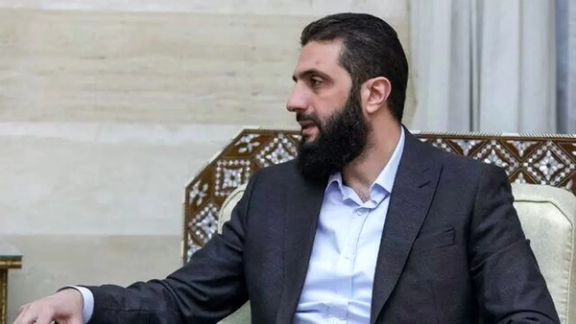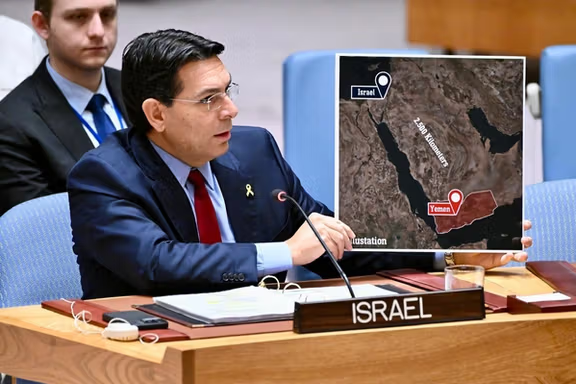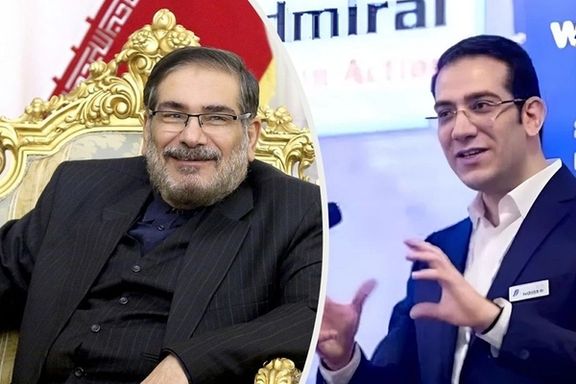US officials urge prevention of Iran's resurgence in Syria during talks in Damascus

US officials raised the need to prevent Iran's resurgence in Syria during talks with interim authorities in Damascus, according to the US Embassy in Syria.

US officials raised the need to prevent Iran's resurgence in Syria during talks with interim authorities in Damascus, according to the US Embassy in Syria.
The discussions also addressed maintaining the fight against ISIS, protecting US citizens, and investigating the fate of disappeared Americans, while emphasizing an inclusive political process that represents all Syrians.
Syria’s new de-facto leader, Ahmed al-Sharaa, expressed hope that Tehran would scale back its military intervention in the region in an interview with Al-Arabiya over the weekend.
The new leader, a former member of Al Qaeda, has made no secret of his pleasure at reducing the influence of Iran in Syria, saying that since the fall of Assad, Syria's opposition had “set the Iranian project in the region back by 40 years”.
Last week, the Arab League bloc of nations called on Iran not to sow discord in Syria following the ouster of President Bashar al-Assad, a long-time ally of Tehran.

One of Iranian President Masoud Pezeshkian's aides has called for direct negotiations with US President-elect Donald Trump, emphasizing the need for a new foreign policy to strengthen international relations.
"We must negotiate with Mr. Trump. The country's issues cannot be left unresolved, and the entire establishment has also reached the conclusion that direct negotiations are necessary," state-media quoted Ali Abdolalizadeh as saying on Tuesday.
Abdolalizadeh was the head of Pezeshkian's presidential campaign and now serves as his special representative for maritime economy.
“We must speak honorably and defend our national interests. From the beginning of the campaign (of President Pezeshkian), we have emphasized that we are proponents of negotiations,” he added.
However, the spokesman for Iran's Islamic Revolutionary Guard Corps (IRGC) on Monday dismissed the significance of Trump’s presidency on the future of Iran, saying “Whether it is Donald Trump or any other president, the strategy remains unchanged, and nothing will alter our path.”
Trump’s administration would revive its maximum pressure strategy against Iran, according to the incoming president’s newly appointed Middle East advisor, Massad Boulos.

The investigation into the case of Parastoo Ahmadi, the 27-year-old singer whose concert defied Iran’s strict laws, has been expanded to include its organizers, the judiciary spokesman said Tuesday.
Asghar Jahangir announced that a case was initially opened in a Tehran court at the instruction of the city’s prosecutor. However, after determining that the alleged offense occurred in Qom province, the case was transferred to the Qom judiciary for further proceedings.
Earlier this month, singer Parastoo Ahmadi challenged Iran's strict dress codes and ban on female solo concerts by performing with her band in an undisclosed caravanserai.
The concert, which she called "imagined," featured Ahmadi with bare shoulders, defying norms that prohibit women from performing solo or appearing in public without a hijab.
The caravanserai where the concert took place has been sealed, according to Jahangir. Investigators are now also focusing on identifying the crew involved behind the scenes, he added.
In mid-December, the judiciary issued a statement saying that the concert was held without legal authorization and adherence to Sharia principles, and that appropriate action will be taken against the singer and production team.
Last week, Ahmadi appeared at Tehran’s prosecutor’s office for an arraignment session where she was formally handed charges against her for performing an online concert without a hijab, violating Iran’s dress mandates, Emtedad news website reported.
She was released on a 30-billion-rials (nearly $38,000) bail. Members of her band, who were also charged, were released on a 20-billion-rials (approximately $25,000) bail each.
Ahmadi was first arrested in Mazandaran, northern Iran, three days after she published a video of her performance on YouTube which garnered over 1.5 million views at the time.
No ban on Taraneh Alidoosti
When asked about the case of actress Taraneh Alidoosti, known for speaking out against the mandatory hijab and is reported to have been given a travel ban, the Judiciary spokesperson said, "She is not banned from flying.”
Last week, filmmaker Mina Akbari reported on X that Alidoosti was planning to travel to Qeshm Island in southern Iran with her daughter when she discovered her national ID code had been blocked for all flights.
Jahangir added that he had checked with the National Organization for Civil Registration, whose head confirmed Alidoosti's national ID card was not blocked. He stated that anyone with such a claim should file a complaint, which would be investigated.
"We do not have a crime called a flight ban," Jahangir noted, although multiple celebrities have been temporarily barred from traveling after they spoke out against the government in recent years, including sports personalities Ali Karimi, Ali Daei, and Farshid Asadian.
Alidoosti, a well-known figure in Iranian cinema and theater, was arrested in November 2022 after publicly protesting the execution of Mohsen Shekari, a young man arrested during the Woman, Life, Freedom protests.
She was released on bail after approximately one month in detention. Upon her release from Evin Prison, she appeared without a headscarf, openly defying Iran's compulsory hijab laws.
Last week, images of Alidoosti without a headscarf backstage at a Tehran theater also circulated widely on social media, further demonstrating her continued defiance.
Judiciary unaware of Italian journalist’s arrest
In spite of the global furore and ensuing diplomatic crisis, the Judiciary spokesman said he was unaware of Italian journalist Cecilia Sala's arrest in Tehran, suggesting she has not been formally charged and was detained by an agency outside the judiciary's purview.
On Monday, the Ministry of Culture and Islamic Guidance confirmed Sala's detention, citing alleged legal violations but withholding specifics.
"Cecilia Sala, an Italian citizen, traveled to Iran on December 13, 2024, with a journalist visa and was arrested on December 19, 2024, on charges of violating the laws of the Islamic Republic of Iran. Her case is currently under investigation," a statement by the ministry said.

Iran’s judiciary spokesman on Tuesday said he had no information about the arrest of Italian journalist Cecilia Sala in Tehran, suggesting that she has not been formally charged and was detained by an agency outside the judiciary's purview.
While judiciary spokesman Asghar Jahangir provided updates on various judicial cases during a press conference on Tuesday, questions remain as to why the judiciary is unaware of the journalist's arrest.
The Ministry of Culture and Islamic Guidance has already confirmed Sala's detention a day earlier, citing alleged legal violations but withholding specifics.
"Cecilia Sala, an Italian citizen, traveled to Iran on December 13, 2024, with a journalist visa and was arrested on December 19, 2024, on charges of violating the laws of the Islamic Republic of Iran. Her case is currently under investigation," a statement by the ministry said Monday.
Confirming Sala's arrest in Tehran, Italy’s Defense Minister Guido Crosetto said last Friday that the entire government, led by Prime Minister Giorgia Meloni and Foreign Minister Antonio Tajani, has been working tirelessly since her detention to secure the journalist’s release.
Sala’s detention in Tehran may be linked to the arrest of a Swiss-Iranian businessman at Malpensa Airport three days earlier on a US warrant for allegedly violating sanctions on electronic exports, La Repubblica reported citing his lawyer.

The last United Nations (UN) Security Council for 2024 warned Iran about any further escalation by Tehran's allied armed group in Yemen, the Houthis.
The meeting was requested by Israel to discuss the Houthis' ongoing targeting of the country. Israeli UN ambassador Danny Danon demanded the Iran-backed militants halt their missile attacks or face consequences.
“This is not a warning,” said Danon, “It is a promise: the Houthis will suffer the same miserable fate as Hamas and Hezbollah."
In a press conference prior to the Security Council session, Iran International’s Maryam Rahmati asked the Israeli permanent representative to the UN if the escalations with the Houthis would increase the likelihood of a direct war with Iran.
In response, Danon did not rule it out and said Israel seeks peace but would prepare for all scenarios.
“I would say also to the Iranian leadership, we have shown our capabilities. We have the ability to strike every target in the Middle East, including Iran,” replied Danon.
It appears Israel may be paving a case to the UN security council for full assault on Yemen’s Houthis.
Since the launch of October 7, the Houthis have fired drones and missiles almost daily towards Israel, describing it as an act of solidarity with Palestinians in Gaza.
Earlier this month, a missile fired from Yemen breached Israel’s air defense systems, striking a playground near Tel Aviv which injured 16 people and damaged homes. The incident occurred only two days after a Houthi missile hit a school in Ramat Gan, the same school that Danon said he attended as a child.
"What would you do if it were your child? Your school? Your city?,” said Danon.
Israel responded by striking targets in Yemen, including Sanaa airport, ports on the west coast of the country, and two power plants. The head of the World Health Organization (WHO), Tedros Adhanom Ghebreyesus was about to board a plane at the airport when he said he had to run for shelter.
Engaging Iran to halt Houthis
Ambassador Danon presented a map showing the distance between Israel and Yemen, adding that Israel and Yemen do not share a border but that the Houthis are being used by Iran as a tool.
The skirmishes between Israel and Yemen are the direct result of Iran's actions against Israel, according to other key member states. Their message was to engage Iran to stop the Houthi operations.
"We can all see clearly that the Houthis are fully enabled by Iran to launch long range and deadly attacks on Israel, including civilian infrastructure, as evidenced by the Houthi's propaganda boasting about the use of advanced hypersonic missiles," US Ambassador Dorothy Shea told the council."
"Iran's provision of these and other lethal weapons to the Houthis violates the arms embargo imposed on the group by this council," she added.
The Deputy US Representative also called the UN to strengthen its verification and inspection mechanism on arms to prohibit any illicit smuggling.
Russian position
Russia, another key security member state, did not reference the Islamic Republic of Iran in its condemnation of the Houthis.
The Russian representative denounced the Houthi’s recent strike on Israel but said the narrative of blame has been one-sided, saying Israel’s action in Gaza are the root cause to the conflict.
“We shouldn't dismiss the broader context because many hotspots of tension today are provoked by the actions of Israel against Palestinians,” said Vasily Nebenzya, a permanent representative to Russia at the UN.
Japan's representative to the UN also mentioned Palestinians, asserting that Houthis' actions do nothing to help their cause and urging Iran to exercise its influence to halt the strikes.
The Washington Institute for Near East Policy's Maritime Attack Tracker recently tallied 106 confirmed Houthis strikes on shipping since November 2023.
The Houthis boast higher numbers and have seized two civilian ships and held another, killing at least four merchant seamen according to Michael Knights of the Washington Insititute who spoke at Monday’s security council session.
'Dangerous escalation'
UN Assistant Secretary-General Mohamed Khaled Khiari addressed the Security Council meeting with a warning that the Mideast is witnessing another dangerous escalation. He condemned attacks in Israel and Yemen.
Britain's representative expressed concern about Israel’s strikes on civilian infrastructure in Yemen, while taking aim at Iran for the Houthis' continued strikes against Israel and their targeting of international shipping in the Red Sea.
"(Iran's) long standing financial and military support to the Houthis has enabled and exacerbated Houthi aggression. Iran bears responsibility for the actions of its proxies, and it must cease its illegal activity, which is destabilizing the region and threatening international peace and stability," said Ambassador Barbara Woodward, UK Permanent Representative to the UN.

Hossein Shamkhani, the son of Iran’s former national security chief, used citizenship-by-investment programs to gain access to the international banking system, Bloomberg reported on Monday.
Shamkhani and his associates secured Dominican passports, later using them to obtain passports from European Union countries like Malta and Cyprus, allowing them to bypass compliance checks from major global financial institutions.
These moves helped his empire gain acceptance from Wall Street banks and Western oil majors, despite his alleged involvement in Iran’s arms dealings with Russia.
Shamkhani’s efforts to keep his business dealings confidential allowed him to build relationships with key global financial figures across hubs like Dubai, Geneva, and London.
Bloomberg’s investigation, based on interviews with more than four dozen people familiar with his network, also highlighted his lobbying efforts in Washington to influence US policy and avoid sanctions enforcement.